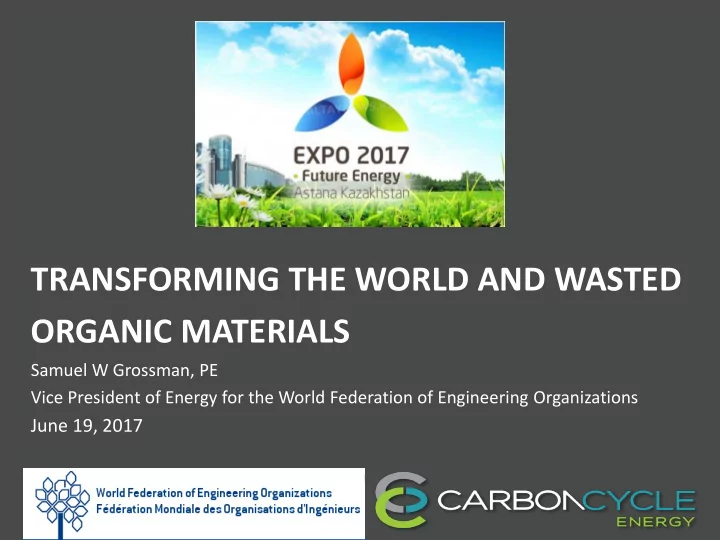

TRANSFORMING THE WORLD AND WASTED ORGANIC MATERIALS Samuel W Grossman, PE Vice President of Energy for the World Federation of Engineering Organizations June 19, 2017
Why transform the World Make beneficial use of resources considered to be waste products, lessen harmful greenhouse gas emissions due to landfilling of organics and reduce the need for fossil fuels. Creating a carbon-neutral fuel that has a long-term future. Building facilities that convert organic materials into pipeline-grade biogas and other sustainable energy products. Feedstock varies from manure, industrial and food processing byproducts, and other agricultural waste. 2
How Can a Project benefit your community? 3
Why Build Projects? Projects will meet 12 of 17 Sustainable Development Goals set by United Nations Our projects: ▪ Produce sustainable fuel, providing a broad set of benefits and direct climate change impact ▪ Match key sustainability objectives of customers (we’re not viewed as just a fuel producer) ▪ Provide long-term positive impacts to regions around projects, ensuring longevity 4
Why Build Projects? Projects create Meaningful Positive Environmental Impact Viable Alternative to Landfills: Americans wasted 130 billion pounds of food in 2015, most of which sits in landfills. Food companies and their stakeholders want to do something beneficial with their waste and do not want exposure to future liabilities that landfills create. Meaningful Impact: Will make a meaningful environmental impact by displacing petroleum-based fuels from the supply each and every year. 5
Opportunity This is the leading edge of a Changing Landscape in renewables • Shift underway to make beneficial use of organics • Pressure to divert organics away from ineffective disposal in landfills Build state-of-the art anaerobic digestion facilities to provide economically sustainable pathways for responsible conversion of organic waste into renewable energy. Convert organic waste (biomass) into several renewable energy products 6
The Bio-refinery Raw Biogas Gas ORGANIC WASTE Purification Agricultural (manure, other) Food Processing & Production • Institutional • Post-Consumer • Expired Food Pipeline 7
What can be Processed? • Animal manure/waste • Food Production waste • Post-Consumer waste • Nearly anything organic 8
Benefits to Local Suppliers Facilities that send their recyclable organics to a Plant will realize: • Steady and reliable processing service • Competitive alternative to landfills, rendering, composting and land application • Access to sustainable co-products • Local sustainable green jobs • Elimination of legacy remediation exposure 9
Proven Digestion Technologies • To eliminate technology risk choose a proven, best-of-breed, market-leading vendors • Choosing the proper platform that offers the most flexibility in feedstock recipe management, process optimization, and general operation • Two-stage Continuous Stir Tank Rector (CSTR) anaerobic digester • Two-stage Mixed Plug Flow digester 10
Gas Purification Technologies • Use a proven gas purification technology • Increase pressure from ambient to gas pipeline transmission requirements 11
Questions Contact Information: Sam.Grossman@C2-energy.com +1 925-354-6590 www.C2-energy.com 12
Recommend
More recommend